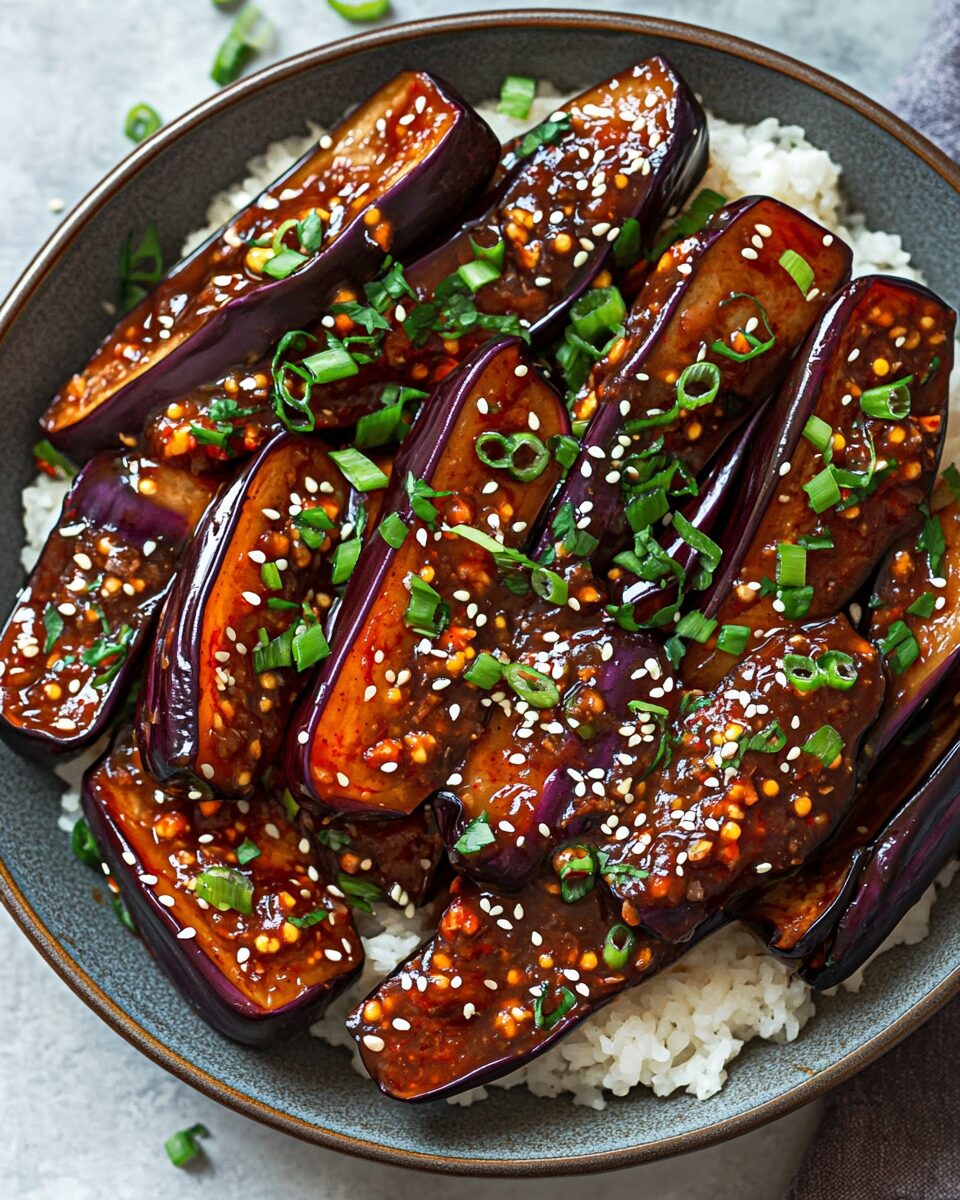Gochujang Eggplant is a bold and flavorful dish that brings together the smoky, tender texture of roasted eggplant with the deep, spicy-sweet umami of gochujang, a Korean fermented chili paste. This dish is perfect for those who love a balance of heat and savoriness in their meals. It can be enjoyed as a side dish, a main course over rice, or even as a filling for wraps and sandwiches.
FULL RECIPE:
Ingredients
- Eggplants
- Gochujang (Korean chili paste)
- Soy sauce
- Sesame oil
- Garlic
- Ginger
- Honey or sugar
- Rice vinegar
- Green onions
- Sesame seeds
Directions
- Preheat the oven and prepare the eggplants by cutting them into halves or thick slices.
- Make a marinade by mixing gochujang, soy sauce, sesame oil, minced garlic, grated ginger, honey, and rice vinegar.
- Brush the eggplant pieces generously with the marinade, ensuring they are well-coated.
- Roast the eggplant in the oven until tender and slightly caramelized.
- Garnish with chopped green onions and sesame seeds before serving.
Nutrition Facts
- Calories: ~180 per serving
- Protein: ~4g
- Carbohydrates: ~22g
- Fats: ~8g
- Fiber: ~6g
- Sugar: ~8g
- Sodium: ~500mg
Origin of Gochujang Eggplant
Gochujang Eggplant is a vibrant and flavorful dish that showcases the bold essence of Korean cuisine. The marriage of tender eggplant with the iconic gochujang paste creates a dish that is both satisfying and packed with umami. Gochujang, a fermented chili paste, has been a staple in Korean cooking for centuries, adding a signature sweet, spicy, and savory flavor to countless dishes. When paired with eggplant, which naturally absorbs surrounding flavors, the result is a culinary masterpiece. This dish is often celebrated in modern Korean-inspired kitchens, bringing the rich traditions of Korean cooking to tables worldwide.
Popularity and Cultural Significance
The popularity of Gochujang Eggplant has grown significantly in recent years, especially as people explore plant-based options and global flavors. With the rise of Korean cuisine on the international culinary stage, dishes featuring gochujang have become increasingly sought after. Gochujang Eggplant appeals to both vegetarians and meat-eaters alike due to its robust flavors and satisfying texture. Many home cooks appreciate how easy it is to prepare while delivering restaurant-quality results. Additionally, its versatility makes it suitable for various occasions, whether served as a side dish at a family dinner or as the star of a plant-based feast.
Flavor Profile and Texture
The flavor profile of Gochujang Eggplant is characterized by its rich complexity. The combination of gochujang paste with garlic, ginger, soy sauce, and sesame oil results in a sauce that is spicy, sweet, and slightly tangy. The eggplant, once roasted or pan-fried, becomes creamy and tender, providing the perfect canvas to absorb the bold sauce. The slightly charred edges offer a smoky undertone, while the garnishes of green onions and sesame seeds add freshness and a nutty crunch. This dynamic blend of flavors and textures makes Gochujang Eggplant a truly memorable dish.
Variations and Customization
One of the best aspects of Gochujang Eggplant is its adaptability. While the classic version is already delicious, there are numerous ways to customize the dish to suit different preferences. For a spicier experience, adding a dash of chili flakes or extra gochujang will enhance the heat. Those seeking a sweeter touch can incorporate honey or maple syrup to balance the spiciness. For additional depth, some recipes suggest adding rice vinegar or lime juice to provide a burst of acidity. Moreover, protein lovers can introduce tofu, tempeh, or thinly sliced beef for a heartier meal. Pairing it with steamed rice or noodles also complements the dish, absorbing the flavorful sauce perfectly.
Presentation and Serving Suggestions
Serving Gochujang Eggplant can be an elegant affair with just a few thoughtful touches. For a traditional presentation, it is often garnished with finely chopped green onions and a sprinkle of toasted sesame seeds. Some home cooks add thin slices of fresh red chili for a vibrant contrast. Serving it in a shallow bowl allows the sauce to pool beautifully, making it easy for diners to scoop up every flavorful bite. As a main course, it pairs wonderfully with steamed white rice or a bowl of brown rice for added fiber. For a low-carb alternative, it can be enjoyed alongside cauliflower rice or a fresh cucumber salad. Adding kimchi or pickled radish on the side provides an extra layer of tanginess that complements the dish.
Health and Nutritional Considerations
Gochujang Eggplant is not only delicious but also offers several health benefits. Eggplants are rich in antioxidants, particularly anthocyanins, which support heart health and reduce inflammation. They are also low in calories and high in fiber, making them an excellent addition to a balanced diet. Gochujang, while providing a kick of spice, is made from fermented ingredients that offer beneficial probiotics for gut health. However, it is essential to be mindful of sodium content, as both gochujang and soy sauce can be high in salt. For a lower-sodium version, using reduced-sodium soy sauce or coconut aminos is a suitable alternative. Those seeking a lighter version can also reduce the amount of sesame oil or opt for an air fryer to roast the eggplant instead of frying it.
Popular Occasions and Uses
Gochujang Eggplant is a versatile dish that can be enjoyed in various settings. It is a fantastic addition to weeknight dinners, offering a quick and easy meal with minimal effort. Additionally, it makes an excellent choice for gatherings and potlucks, as it can be served warm or at room temperature. Its striking presentation and vibrant colors make it a conversation starter at dinner parties. For those embracing plant-based diets, it serves as a satisfying main course, while others may enjoy it as a flavorful side dish alongside grilled meats or Korean BBQ. Regardless of the occasion, Gochujang Eggplant consistently leaves a lasting impression on those who try it.
Conclusion
Gochujang Eggplant is a true celebration of Korean flavors and culinary artistry. Its bold, spicy-sweet profile and tender, creamy texture make it a standout dish that appeals to a wide range of palates. Beyond its taste, the dish offers flexibility and customization, allowing home cooks to experiment and make it their own. Whether enjoyed as a comforting weeknight meal or as part of a festive gathering, Gochujang Eggplant brings warmth and vibrancy to the table.






